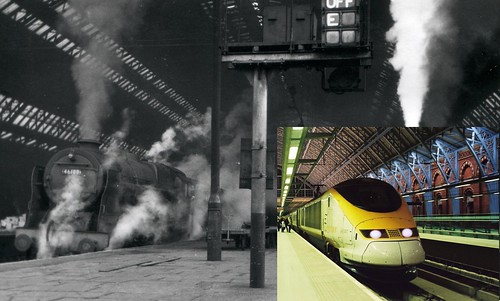The end of the year, especially one ending in zero, is a time to look back. Here is London St Pancras in 1960. Who, when the picture was taken, would have imagined that fifty years later it would have been possible to catch a train from the same place, that would get them to Paris in three hours? Yet only few years ago, carriages of the same design as those in the train on the left were still in front line service.
Change happens in ways that we cannot expect, but long-lived pieces of capital equipment like trains, on the drawing board today, are likely to be still in use in 2070. What will the world be like in 2070? No-one can know. We can be certain that it will be very different. Energy will be relatively much more expensive. Fewer people will be able to afford cars and air travel, which means that the railways will not have to compete with the alternatives in the same way. Probably too, the train operators of fifty years' time will have to work hard just to offer a service that most people can afford.
In the next five decades, we can expect two or three cycles of boom-and-bust, major changes in technology, which stand as much chance of being lower-tech than higher-tech, demographic shifts, with associated changes in patterns of settlement and land use, and a high probability of significant natural or man-made events, the effects of which will could stretch countries and communities to the limit, and possibly beyond.
To this mix must be added in the chronic uncertainty over investment plans that can be cancelled, reinstated, amended, and cancelled again several times before any works actually start.
What kind of rolling stock is suitable for an environment so permeated by uncertainties? I hope someone is asking the question.

Kommentarer